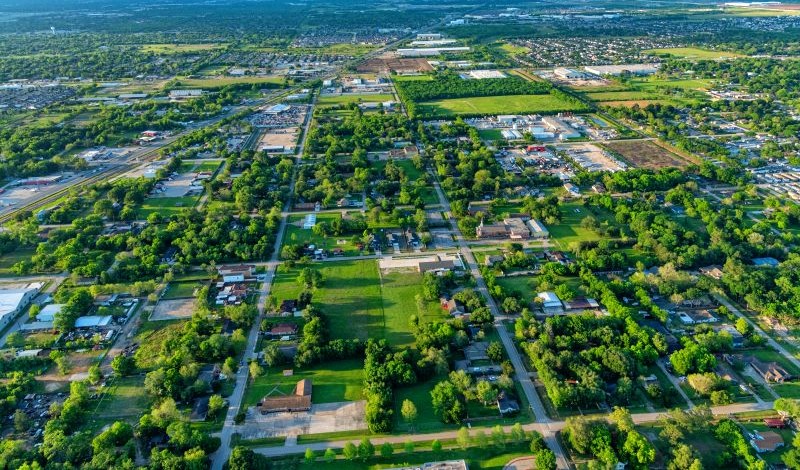
A new Texas law prohibits certain noncitizens from buying and leasing property.
For noncitizens residing in Texas, entering into a one-year lease or buying a second home may result in fines, jail time, and property seizure.
Texas Governor Greg Abbott signed a bill into law “to protect Texans against threats from hostile foreign adversaries.” The new law restricts certain noncitizens from four designated countries—China, Russia, Iran, and North Korea—from purchasing or acquiring property in Texas.
Who will feel the effect of these restrictions? The law, which went into effect on September 1, 2025, applies to noncitizens who are members of the ruling political party in a designated country or are domiciled there. The Texas legislature defines domiciled as “having established a place as an individual’s true, fixed, and permanent home and principal residence to which the individual intends to return whenever absent.” The law also affects individuals who only hold citizenship in a designated country or act as an agent of that country.
The law, however, contains some exceptions. The Texas legislature created a carve-out for U.S. permanent residents and citizens of the designated countries who are lawfully domiciled in the United States.
The affected parties are not just individuals, but business entities as well. The law targets companies and organizations headquartered in a designated country, directly or indirectly controlled by the government of a designated country, or majority owned by those who otherwise fall within the scope of the law. As a result, some foreign companies have reportedly halted business ventures in Texas.
Sometimes referred to as an “anti-alien land law,” the new Texas law has raised several legal questions, such as whether Texas has interfered with the federal scheme on foreign investment and violated the Equal Protection Clause.
In Wang v. Paxton, three Chinese citizens studying in the United States challenged the Texas law on constitutional grounds. In August, a federal trial court in Texas dismissed the case before addressing the claims. The court held that the Chinese individuals who brought the suit were unable to show that they would “sustain any injury upon eventual enforcement” of the law.
This principle, known as standing, requires that a plaintiff filing a lawsuit experience a concrete injury caused by the opposing party’s actions for a lawsuit to proceed. The court reasoned that the plaintiffs in this case were not domiciled in China because they currently resided in Texas and had a “stated intention to remain” there, so the law’s restrictions on leasing did not apply to them.
Having dismissed the case for lack of standing, the court did not discuss the issue of possible federal preemption that had been raised in the plaintiffs’ lawsuit. Federal law ordinarily preempts state law whenever the latter conflicts with a federal statute. The plaintiffs had argued that federal laws governing foreign investment and property ownership preempt Texas law.
They based their argument on the Foreign Investment Risk Review Modernization Act. In 2018, Congress passed this act to broaden national-security review of foreign investments in the United States. Under the act, a federal investigatory body may examine foreign real estate transactions located near “covered” sites, including some airports, maritime ports, and military installations. The act excludes transactions involving “a single housing unit” from federal review, such as apartment leases.
The plaintiffs challenging the Texas law had argued that the state law undercuts “Congress’s carefully considered calibration as to when foreign ownership interests in American real estate…ought or ought not to be subject to scrutiny.” In response, the state of Texas argued that the law did not conflict with U.S. foreign policy because the Texas legislature did not seek to “influence the conduct” of foreign governments. The state also cited a decision in which a federal trial court in Florida rejected a federal preemption challenge to a similar state law.
The plaintiffs had also argued that the Texas law conflicts with the Fair Housing Act, which prohibits discrimination in the sale or rental of housing based on race or national origin. The plaintiffs stressed that the “obvious and natural result will be to encourage sellers not to sell to anyone who might possibly come under the law.” Texas had replied that the federal housing law does not include discrimination based on “alienage, citizenship, and lawful-permanent resident status.”
The new state law continues an existing tradition of alien land laws in Texas. In 1921, in response to a wave of anti-Japanese sentiment, Texas passed a law that barred individuals ineligible for U.S. citizenship from owning land. Just like the preamble to the 2025 bill, which alleges that China poses a security threat through its control over mineral resources, a clause in the 1921 law stated that noncitizens “attempting to acquire title to large bodies of fertile land” constituted a state “emergency.”
Unlike the current law, however, the 1921 law did not target certain countries and instead used eligibility for citizenship as a proxy for Japanese immigrants. Although the 1921 prohibition remained valid law for over 40 years before it was repealed, the lifespan of the current law remains to be seen. An appeal of the federal trial court’s decision on the plaintiffs’ standing to challenge the new Texas law is still pending.



